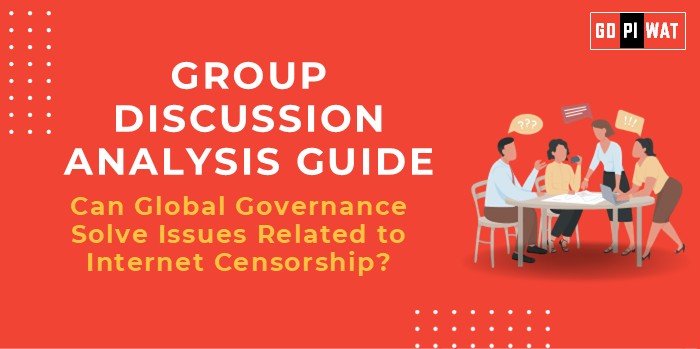📋 Group Discussion (GD) Analysis Guide
🌐 Can Global Governance Solve Issues Related to Internet Censorship?
📖 Introduction to Internet Censorship and Global Governance
Context Setting: In a hyperconnected world, the control of internet access and content has become a pressing global issue, with implications for democracy, privacy, and freedom of expression. Global governance mechanisms are increasingly called upon to address these challenges.
Topic Background: Internet censorship, implemented by various governments to regulate content, often conflicts with international norms of free speech. Efforts like the United Nations Internet Governance Forum (IGF) and World Summit on the Information Society (WSIS) aim to promote equitable internet policies. However, achieving a universal consensus remains elusive.
📊 Quick Facts and Key Statistics
- 🌍 Global Internet Users: Over 5 billion (as of 2024), highlighting the internet’s critical role in daily life.
- ⚠️ Censorship Hotspots: 62% of global internet users live in countries that censor online content (Freedom House 2023).
- 💸 Economic Impact: Internet shutdowns cost $24 billion globally in 2023 (Top10VPN Report).
- 🌐 UN Participation: 193 countries involved in internet governance discussions under the UN framework.
🌟 Stakeholders and Their Roles
- 🏛️ Governments: Enforce or challenge censorship policies based on national interests.
- 🏢 Tech Companies: Gatekeepers of content, often mediating between legal compliance and user rights.
- 🤝 Civil Societies: Advocate for freedom of expression and resist oppressive measures.
- 🌐 International Organizations: UN and ITU promote cross-border cooperation to uphold internet freedom.
🏆 Achievements and Challenges
✨ Achievements
- ✅ Global Cooperation: IGF fosters dialogue on balancing security with freedom.
- 🔒 Technological Tools: VPNs and encryption promote privacy and resist censorship.
- 🌍 Case Study: Estonia’s open internet policy serves as a global standard.
⚠️ Challenges
- ⚔️ Conflicting Interests: Democracies advocate openness, while authoritarian regimes prioritize control.
- 🤖 Technological Manipulation: AI-driven content moderation often skews information.
- 📘 Case Study: China’s “Great Firewall” showcases efficient but restrictive control.
📘 Global Comparisons:
– Success: Estonia promotes unrestricted internet access and transparency.
– Challenges: Countries like Iran and North Korea exhibit extreme censorship levels.
💬 Structured Arguments for Discussion
- ✅ Supporting Stance: “Global governance is essential for establishing universal principles to counter arbitrary censorship and protect user rights.”
- ❌ Opposing Stance: “Global governance often lacks enforcement power, making it ineffective against sovereign decisions.”
- ⚖️ Balanced Perspective: “While global governance offers a framework for collaboration, implementation requires respecting national autonomy.”
💡 Effective Discussion Approaches
- 🌏 Opening Approaches:
- “With over 5 billion internet users globally, the need for consistent rules to address censorship is more urgent than ever.”
- “Consider China’s Great Firewall and its global ripple effects on digital policies.”
- “How do we balance freedom of speech with national security concerns?”
- 🤔 Counter-Argument Handling:
- Use the EU’s GDPR to argue for enforceable global frameworks.
- Present the Tor Network as an example of bypassing censorship effectively.
🔍 Strategic Analysis of Strengths and Weaknesses
- 💪 Strengths: Broad international participation; technological advancements.
- ⚖️ Weaknesses: Sovereign conflicts; enforcement gaps.
- 📈 Opportunities: AI for content verification; multi-stakeholder governance models.
- ⚠️ Threats: Escalating geopolitical tensions; misuse of technology.
🎓 Connecting with B-School Applications
- 🌍 Real-World Applications: Research on public policy models, cybersecurity projects, and technology’s role in governance.
- 💬 Sample Interview Questions:
- “How can businesses ensure compliance with international internet policies?”
- “Should companies prioritize user privacy over government regulations?”
- 💡 Insights for Students:
- Engage in debates on corporate social responsibility in tech.
- Explore business ethics in global governance frameworks.


